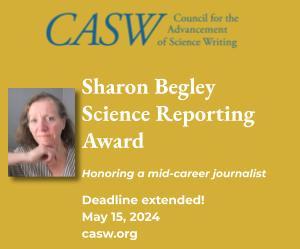A panel of experts highlighted the challenges of covering global climate change for an audience intent on learning how to get ink for this controversial topic. Cristine Russell moderated a session packed with good science and commonsense tips from seasoned journalists.
Ralph Cicerone, president, National Academy of Science, whittled down dense, complex data into understandable language. He explained how previous calculations of planetary heat underestimated the magnitude of the problem and then provided a compelling snapshot: During the past 30 years, average temperatures in the Arctic have soared 2 to 3 degrees C because of greenhouse gases.
Matthew C. Nisbet, assistant professor, American University School of Communication, discussed the challenges getting attention for climate change in an era of media overload. He explained that people follow a narrow set of stories that they're already interested in, because everyone is a cognitive miser. Consequently, despite an abundance of available information on global warming, people generally have a very limited grasp of the problem. "Reframing" global warming for them, by appealing to partisanship, moral duty or religiosity is a helpful tactic. Science writers need to convey the personal relevance of global warming, and to get the public engaged in finding ways to redefine the issues to appeal to conservatives.
Dan Vergano, science reporter, USA Today, talked about how to compete for coverage space. He described some strategies he uses to sway editors. Fitting science into the real world and being up front with readers about sources is critical: If story involves politics, say so. And if you're doing story about politics, then talk to politicians; if you're not talking to them, don't put them in the piece. He warned science journalists to avoid the temptation to simply write off administration policies. He suggested cultivating business and insurance contacts, because they understand the issue and can provide credibility to a story.
Juliet Eilperin, national environmental reporter, The Washington Post, described her experiences covering politics. She relayed an insider's take on politics and how that affects environmental issues. Few politicians talk about global warming, which is why it doesn't get more coverage. Polls show people aren't all that concerned about energy and the environment, diminishing interest in coverage.
The question and answer session sparked lively debate about getting the issue in front of readers who don't necessarily care about global warming. Attendees debated the best ways to get through to editors to support climate change stories. They discussed the importance of local angles: Stories that report how a given area's residents are taking action have a big impact because they let people see how community groups can make a difference. Another method is to recruit the television weathermen as local opinion leaders. How to resolve real life situations and problems occupied attendees until the session's end.
Leslie Sabbagh is contributing editor for science for Popular Mechanics. A freelance journalist, she covers medicine, the military, and aerospace.
.png)

